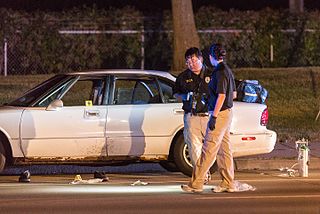
The Violent Crime Control and Law Enforcement Act of 1994, commonly referred to as the 1994 Crime Bill, or the Clinton Crime Bill, is an Act of Congress dealing with crime and law enforcement; it became law in 1994. It is the largest crime bill in the history of the United States and consisted of 356 pages that provided for 100,000 new police officers, $9.7 billion in funding for prisons which were designed with significant input from experienced police officers. Sponsored by U.S. Representative Jack Brooks of Texas, the bill was passed by Congress and signed into law by President Bill Clinton. Then-Senator Joe Biden of Delaware drafted the Senate version of the legislation in cooperation with the National Association of Police Organizations, also incorporating the Assault Weapons ban and the Violence Against Women Act (VAWA) with Senator Orrin Hatch.

Megan's Law is the name for a federal law in the United States requiring law enforcement authorities to make information available to the public regarding registered sex offenders. Laws were created in response to the murder of Megan Kanka. Federal Megan's Law was enacted as a subsection of the Jacob Wetterling Crimes Against Children and Sexually Violent Offender Registration Act of 1994, which merely required sex offenders to register with local law enforcement. Since only a few states required registration prior to Megan's death, the state-level legislation to bring states in compliance—with both the registration requirement of Jacob Wetterling Act and community notification required by federal Megan's Law—were crafted simultaneously and are often referred to as "Megan's Laws" of individual states. Thus, the federal Megan's Law refers to community notification, whereas state-level "Megan's Law" may refer to both sex offender registration and community notification.

Patricia Lynn Wetterling is an American advocate of children's safety and chair of the National Center for Missing and Exploited Children. Her advocacy particularly focuses on protecting children from abduction and abuse. In recent years Wetterling has become one of the most vocal critics of current sex offender registry laws, painting them as overly broad and unnecessarily causing tremendous harm to many. Her advocacy began after her son Jacob was abducted in 1989 and culminated in passage of the federal Jacob Wetterling Crimes Against Children and Sexually Violent Offender Registration Act. She was a candidate for the Minnesota Sixth District seat in the United States House of Representatives as the Democratic-Farmer-Labor Party candidate in 2004 and 2006, losing to Republicans Mark Kennedy and Michele Bachmann respectively. In September 2016, the remains of her son Jacob were discovered and positively identified.

Jacob Erwin Wetterling, an American boy from St. Joseph, Minnesota, was kidnapped from his hometown and murdered on October 22, 1989, at the age of 11. His abduction remained a mystery for nearly 27 years.
Some jurisdictions may commit certain types of dangerous sex offenders to state-run detention facilities following the completion of their sentence if that person has a "mental abnormality" or personality disorder that makes the person likely to engage in sexual offenses if not confined in a secure facility. In the United States, twenty states, the federal government, and the District of Columbia have a version of these commitment laws, which are referred to as "Sexually Violent Predator" (SVP) or "Sexually Dangerous Persons" laws.
A sex offender is a person who has committed a sex crime. What constitutes a sex crime differs by culture and legal jurisdiction. The majority of convicted sex offenders have convictions for crimes of a sexual nature; however, some sex offenders have simply violated a law contained in a sexual category. Some of the serious crimes which usually result in a mandatory sex-offender classification are sexual assault, statutory rape, bestiality, child sexual abuse, incest, rape, and sexual imposition.

The Dru Sjodin National Sex Offender Public Registry is a cooperative effort between U.S. state agencies that host public sex offender registries and the U.S. federal government. The registry is coordinated by the United States Department of Justice and operates a web site search tool allowing a user to submit a single query to obtain information about sex offenders throughout the United States.

Jessica's Law is the informal name given to a 2005 Florida law, as well as laws in several other states, designed to protect potential victims and reduce a sexual offender's ability to re-offend which includes a mandatory minimum sentence of 25 years in prison and lifetime electronic monitoring when the victim is less than 12 years old. A version of Jessica's Law, known as the Jessica Lunsford Act, was introduced at the federal level in 2005 but was never enacted into law by Congress.

The Adam Walsh Child Protection and Safety Act is a federal statute that was signed into law by U.S. President George W. Bush on July 27, 2006. The Walsh Act organizes sex offenders into three tiers according to the crime committed, and mandates that Tier 3 offenders update their whereabouts every three months with lifetime registration requirements. Tier 2 offenders must update their whereabouts every six months with 25 years of registration, and Tier 1 offenders must update their whereabouts every year with 15 years of registration. Failure to register and update information is a felony under the law. States are required to publicly disclose information of Tier 2 and Tier 3 offenders, at minimum. It also contains civil commitment provisions for sexually dangerous people.
Florida Public Safety Information Act was passed in 1997 in Florida to list sexual predators and sexual offenders on the internet and to make the same information available through a 24-hour/day hotline.
A sex offender registry is a system in various countries designed to allow government authorities to keep track of the activities of sex offenders, including those who have completed their criminal sentences. Sex offender registration is usually accompanied by residential address notification requirements. In many jurisdictions, registered sex offenders are subject to additional restrictions, including on housing. Those on parole or probation may be subject to restrictions that do not apply to other parolees or probationers. These may include restrictions on being in the presence of underage persons, living in proximity to a school or day care center, owning toys or items targeted towards children, or using the Internet. Sex offender registries exist in many English-speaking countries, including Australia, Canada, New Zealand, the United States, Trinidad and Tobago, Jamaica, South Africa, the United Kingdom, and the Republic of Ireland. The United States is the only country that allows public access to the sex offender registry; all other countries in the English-speaking world have sex offender registries only accessible by law enforcement.

Crime in Minnesota encompasses a wide range of unlawful activities that occur within the state, regulated by both state and federal laws. While crime rates in Minnesota are generally below the national average, certain areas and types of crime have garnered public attention.
Child sexual abuse laws in the United States have been enacted as part of the nation's child protection policies.
United States v. Kebodeaux, 570 U.S. 387 (2013), was a recent case in which the Supreme Court of the United States held that the Sex Offender Notification and Registration Act (SORNA) was constitutional under the Necessary and Proper Clause.

The International Megan's Law to Prevent Child Exploitation and Other Sexual Crimes Through Advanced Notification of Traveling Sex Offenders is a federal law that requires, among other things, a visual "unique identifier" to be placed on the passports of registrants convicted of sex offenses involving a minor. The law also requires covered offenders to notify law enforcement 21 days before traveling abroad. Critics have claimed violation of constitutional rights and note that the law would also cover those who were convicted as minors.

Women Against Registry (W.A.R.) is a U.S. non-profit organization, based in Arnold, Missouri, which works to obtain changes in laws affecting sex offenders. Most W.A.R. members are mothers, wives, girlfriends, and other family members of persons convicted of a sexual offense. W.A.R. advocates the abolition of sex offender registries altogether, but also wants officials to be more judicious in deciding who poses a risk, instead of the current policies applied to all offenders indiscriminately.

Sex offender registries in the United States exist at both the federal and state levels. Registries contain information about persons convicted of sexual offenses for law enforcement and public notification purposes. All 50 states and the District of Columbia maintain sex offender registries that are open to the public via websites; most information on offenders is visible to the public. Public disclosure of offender information varies between the states depending on offenders' designated tier, which may also vary from state to state, or risk assessment result. According to NCMEC, as of 2016 there were 859,500 registered sex offenders in United States.

The constitutionality of sex offender registries in the United States has been challenged on a number of state and federal constitutional grounds. While the Supreme Court of the United States has twice upheld sex offender registration laws, in 2015 it vacated a requirement that an offender submit to lifetime ankle-bracelet monitoring, finding it was a Fourth Amendment search that was later ruled constitutionally unreasonable by the state court.

The movement to reform sex offender laws in the United States describes the efforts of individuals and organizations to change state laws requiring Sex offender registries in the United States.

Alliance for Constitutional Sex Offense Laws (ACSOL) is a nonprofit civil rights, legal reform, and support organization, in Sacramento. ACSOL advocates for the protection of the constitution by restoring the rights of those required to register as sex offenders, and their families. ACSOL was formerly known as California Reform Sex Offender Laws.







